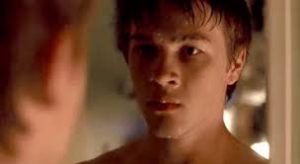
 Closet Monster, the debut feature film by director Stephen Dunn, is both refreshingly poignant as well as deeply provocative. The film has already won numerous awards, including Best Canadian Feature at the Toronto International Film Festival and was named by TIFF’s annual series as one of the ten best Canadian films of the year. The movie portrays the challenges of Oscar Madly (played brilliantly by Connor Jessup) a young man coming to terms with a haunting past trauma, confusion about his sexuality, first love, the realities of his flawed parents, and the desire to escape his hometown. Sofia Banzhaf plays Gemma, his absolutely adorable and charmingly quirky best friend, and Aliocha Schneider plays Wilder, a new love interest that ultimately plays a significant role in Oscar’s self-discovery. Also, Isabella Rossellini plays the voice of Buffy, Oscar’s taking hamster. Yes, there is a talking hamster, and she is so seamlessly written into the story that I barely noticed the detour from reality.
Closet Monster, the debut feature film by director Stephen Dunn, is both refreshingly poignant as well as deeply provocative. The film has already won numerous awards, including Best Canadian Feature at the Toronto International Film Festival and was named by TIFF’s annual series as one of the ten best Canadian films of the year. The movie portrays the challenges of Oscar Madly (played brilliantly by Connor Jessup) a young man coming to terms with a haunting past trauma, confusion about his sexuality, first love, the realities of his flawed parents, and the desire to escape his hometown. Sofia Banzhaf plays Gemma, his absolutely adorable and charmingly quirky best friend, and Aliocha Schneider plays Wilder, a new love interest that ultimately plays a significant role in Oscar’s self-discovery. Also, Isabella Rossellini plays the voice of Buffy, Oscar’s taking hamster. Yes, there is a talking hamster, and she is so seamlessly written into the story that I barely noticed the detour from reality.
I’m loathe to try to describe Closet Monster further, because it is so much more than a coming-of-age story or simply a story about accepting one’s sexual orientation. There is a subtlety in the writing, acting and tantalizingly gradual scene progression from less to more intense, that engages the viewer with such finesse (and a vague sense of anxiety) one can’t wait to see what happens next. There are no explosions, car chases or shoot outs, and yet I had to see what becomes of Oscar Madly.

One of the greatest triumphs of this film is that it addresses issues of sexuality and sexual orientation with evocative sincerity and importance, but does not show as if it is intended purely for the non-heterosexual community. I related to the character of Oscar, not in his maleness or sexual orientation, but to his angst, isolation and the perils of introspection that many of us can remember from our teen years. While his sexual issues are prominent, the vulnerability his self-doubt creates is something shared by most of mankind at one point or another. Dunn stated that a lot of discussion and thought was put into making the film one that could be related to universally. “We never set out to make an issue film,” he said, “[it’s about] a young man grappling with his sexuality…but there’s more to it.” Also, he “didn’t make this story just for a queer audience… these stories are no longer ghettoized.” Though this examination of what it means to be young and gay (especially without the support of a functional family) is not the only issue central to the film, it is handled with such raw and vulnerable feeling, it’s undeniably an important statement on the nature of insecurity, fear, growing up, and the need for tolerance.
Stylistically, Closet Monster is unique and singularly imaginative. There are some absolutely gorgeous camera shots and angles, filmed with an up-close and natural style that lends a visceral reality to what is on the screen. The most inspiring film-making elements, though, are the visual images and fantasies that periodically flash in Oscar’s mind – from erotic, to nostalgic, to frightening, to just stunning. Most of these flashes last only a moment and are frequent enough so as not to seem disconnected, but far enough apart that the viewer is surprised and immediately drawn in when it happens. These images elevate the film to a higher level artistically, as well as adding layers of meaning to the delicately understated action of the film.

The film style is also noteworthy in that it almost completely follows the point of view of Oscar. He is in almost every scene, save a few brief moments. It’s a walk, then jog, then sprint to the finish, and we are with Oscar on every step of his journey. When asked about the possible pressure of being in every scene, Jessup explained that, “in a weird way, it was almost easier because when you’re working every day, in every scene, you don’t really have any time to do anything else… You can’t really afford to overthink. It forces intuition on you.” He had earlier mentioned that approaching an acting project often causes him “crippling anxiety” and said that he is learning the more he thinks and prepares beforehand, the more intuitive acting takes over once on the set. Needless to say, his performance shows no signs of anxiety, crippling or otherwise.
Now, let’s address the hamster. She is an important piece of Oscar’s past, given to him in a moment of extreme childhood crisis, and becomes a comforting and stabilizing presence in Oscar’s mind throughout the film. I asked Stephen Dunn about the character, who is a major role in the movie, and his thought process in including the pet and having her speak. He stated that he grew up as an only child and that “…my experience is, when you’re a kid and by yourself, a pet can take on a more substantial presence in your life and personify, in a way, that you have a friend or someone to talk to when you’re alone…” Dunn also explained that Buffy provides “a wonderful maternal presence” and whimsical touch of levity, in a story that has some intensely emotional situations. Isabella’s accent is fabulous, of course, on which Stephen, Connor, and myself all agreed. In fact, the word “iconic” was used and is, I believe, completely appropriate.
In every interview, I like to include a few questions I like to think the interviewee has never heard before. So, I asked Connor and Stephen:
If the zombie apocalypse is upon us, what one item would you choose?
- Replicator from Star Trek except it’s portable so you can have food anywhere.
- baseball bat
- sunscreen and deodorant
- books
- ninja throwing star
- invisibility cloak
Connor chose the Replicator and Stephen bent the rules a bit and chose the Replicator and the invisibility cloak.
The second frivolous question was what talking pet would they choose?
- octopus
- tiger
- snake
- hairless cat you can draw on with non-toxic markers
While I think the cat with markers threw them off a bit, Stephen went with octopus because they communicate telepathically (who knew?) but admits he does not particularly like them and they “make him feel gross inside.” Connor went with tiger and a nod to Life of Pi.
Silliness aside, Closet Monster is a must-see film with a director and cast who will undoubtedly continue to provide us with more innovative movies and epic performances in the future. The film opened yesterday in Toronto. It opens in Vancouver, Halifax and St. John’s on July 22nd, and in Montreal on the 29th.

![[CRAFTS] ‘LITTLE WOMEN’ AND MY NEW FAVORITE KNITWEAR OBSESSION](https://geekd-out.com/wp-content/uploads/2020/01/Little-Women-featured-image-150x150.jpg)

